Peer-to-peer program for Malagasy students remains only one of its kind
By Shannon Sigafoos
Five years ago, attending college in America was just “a fairy tale” for Narindra Andrisoamampianina ’23. Having never traveled outside of her hometown of Antananarivo, Madagascar, Andrisoamampianina—like other Malagasy students who have studied at Lafayette—comes from a very different socioeconomic and cultural background.
English was her third language. High schools there often have fewer resources and very large classes. Madagascar is also one of the most impoverished countries in the world and not all schools are equipped with the sophisticated technologies found in North America.
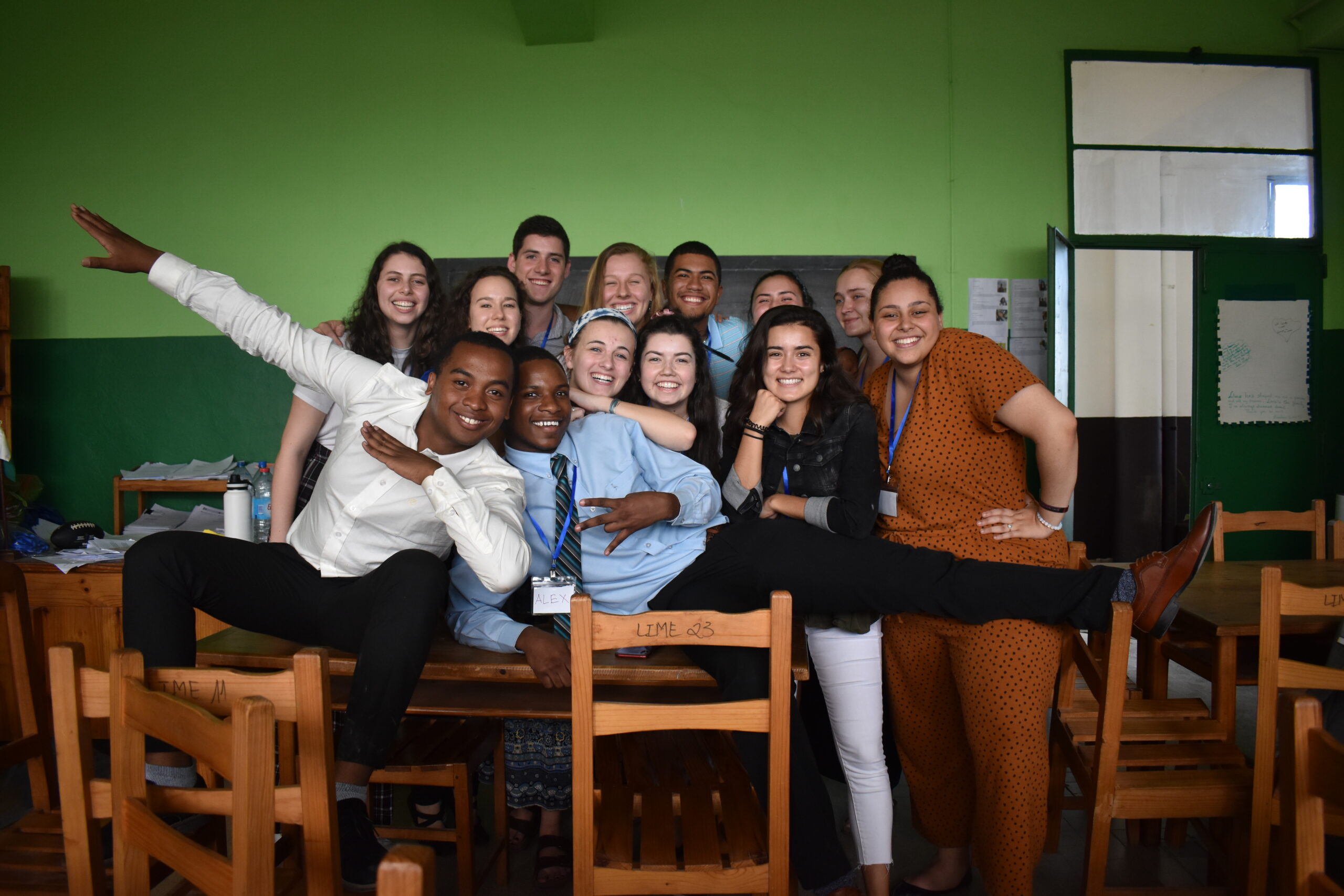
Lafayette students work as peer mentors at Madagascar high school as part of the LIME program.
Which is why Lafayette students voluntarily making the trip there—with plenty of supplies in hand—completely changed Andrisoamampianina’s academic journey at her high school, Lycée Andohalo.
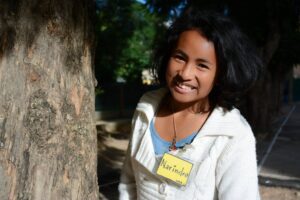
Narindra Andrisoamampianina ’23 was originally a LIME mentee student in Madagascar and is now studying at Lafayette.
“I was selected [to take part in the program] at the end of 10th grade, based on my GPA and my grades in math and English. I was told that I would have to take the SAT and the TOEFL (Test of English as a Foreign Language) tests, and complete the application, and that’s not easy. It took three tries for me to achieve a score high enough to apply to Lafayette,” she says. “But on the other hand, I felt so blessed. It’s amazing to think that these students came from so far away to teach at a public school—which never happens in real life.”
It’s been a decade since David Stifel, professor of economics, first took a group of students to Madagascar for what would ultimately become the Lafayette Initiative for Malagasy Education (LIME). The peer-to-peer mentoring program between Lafayette students and high school students from Madagascar prepares the latter for the process of applying to U.S. colleges that provide financial aid for international students.
Each academic year, a team of 12 Lafayette students are nominated by faculty members to formally commit to mentoring Malagasy students over a one-and-a-half-year period, which includes a three-week trip to Madagascar.
This initiative, which focuses solely on Malagasy students, is still the only one of its kind among U.S. colleges and universities.
“This particular program has brought eight Malagasy students to the U.S., and they’ve all come to Lafayette. We’ve had one student [arrive] each year, so right now we have a senior, junior, sophomore and first-year students,” shares Susan Averett, Charles A. Dana Professor of Economics, who has taken the trip four times. “This is a brilliant program, and it’s remarkable on Lafayette’s part because these are students who require full financial aid. It changes their entire life. Lafayette has made an investment in these Malagasy students, and the Lafayette students themselves have made an investment. I think that’s really amazing.”
While the January 2021 trip has been canceled due to travel restrictions associated with COVID-19, this year’s team of Lafayette students will continue to mentor the Malagasy students virtually.
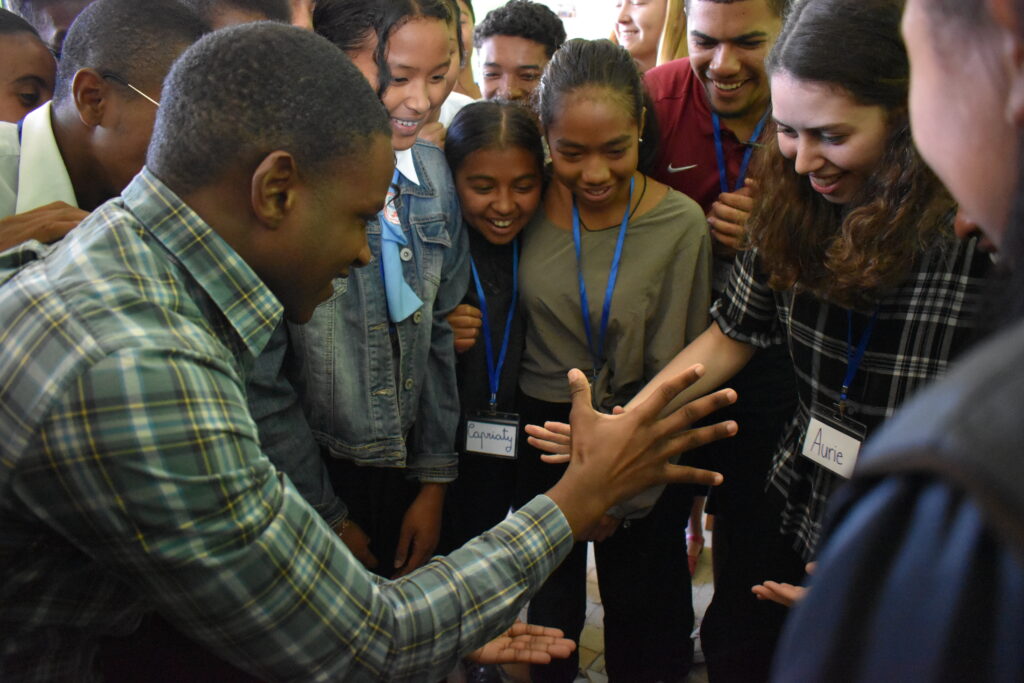
Aurie Greenberg ’22, right, participates in a group exercise with a group of Malagasy students at Lycée Andohalo.
Roots of the program
When R. Niels Marquardt served as the U.S. ambassador to Madagascar from 2007 to 2010, he began to realize that Malagasy students were severely underrepresented at American colleges and began reaching out to those colleges one by one. A letter he sent in January 2008 to then-Lafayette President Daniel Weiss, aiming to increase the level of educational exchanges and institutional linkages between the two countries, provided Stifel with the opportunity to follow up during a research trip to Madagascar.
Because a number of roadblocks existed for these students—particularly the cost of education and travel, as well as language and testing barriers—Stifel (along with then-dean of advising and co-curricular programs Erica D’Agostino) decided to take a three-week trip to see if it would be possible to bring the training to them.
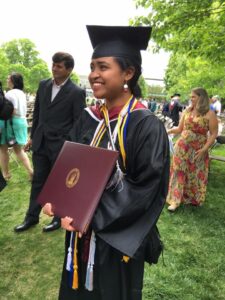
Rebeka Ramangamihanta ’16 graduated from Lafayette with a degree in economics and international affairs.
The inaugural LIME trip in 2010 offered an opportunity for Malagasy students to get a different type of education than what is offered in the French system, to broaden their horizons and create more opportunities for them. The first group of mentors paved the way for Lafayette’s first Malagasy enrollee, Rebeka Ramangamihanta ’16, to come to campus in fall 2012.
“Many of my mentors, professors, and Lafayette staff have, in one way or another, been involved with and have been big supporters of the LIME program. It is those people who saw my potential from the beginning,” says Ramangamihanta, who recently completed a master’s of development practice at University of California at Berkeley. “They challenged me and pushed me to always give my best. They helped me even before my arrival on campus and supported my transition to this foreign land. The LIME community was one of my important support systems throughout my undergraduate experience.”
“The most obvious impact of the program has been on the Malagasy students who have come to Lafayette. I am so proud of all that they have accomplished,” says Stifel. “But the broader impact is on the LIME community in Madagascar. They are active in learning English and developing their cross-cultural awareness. For those who may never leave Madagascar, these skills will nonetheless be important. Further, the LIME students in Madagascar are doing their own outreach and having an even broader impact.”
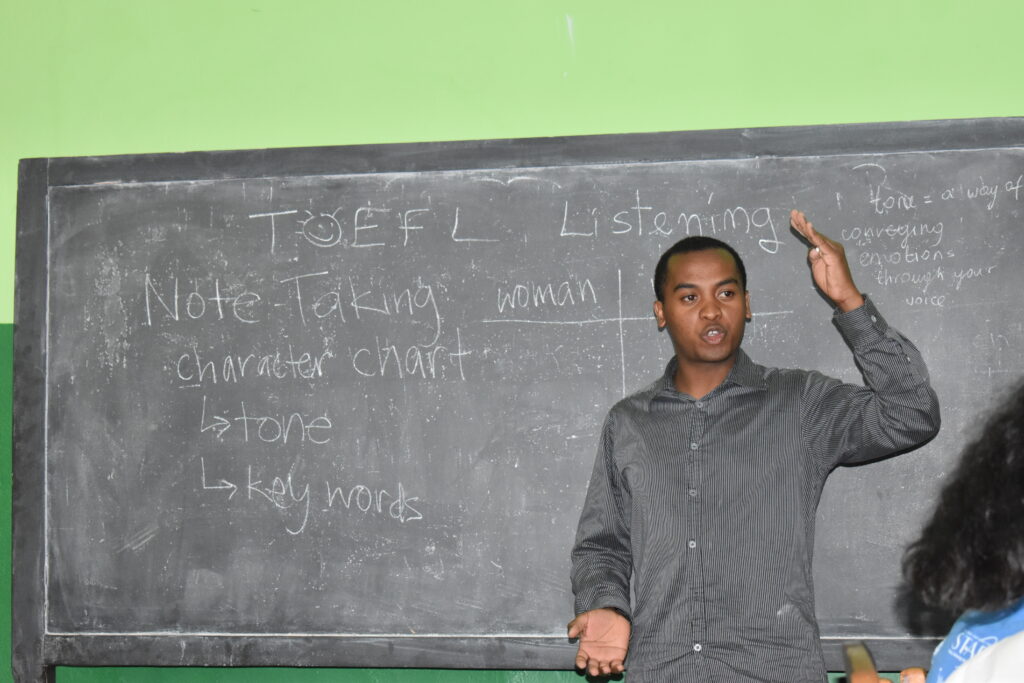
Tafita Rakotozandry ’22 teaches a group of LIME mentees at their high school in Madagascar.
Program partner
A successful partnership between Lafayette and Lycée Andohalo would not have been possible without the tireless efforts of Vatosoa Raharinosy, an English teacher at the school who voluntarily stepped up to serve as its first-ever career counselor. Raharinosy mentors top students to prepare them to apply to
universities in the U.S., and through counseling and extracurricular activities, she inspires students to take their education to the next level. She not only works with students to improve their English, but she also prepares them for standardized testing and mentors them in their own personal development.
“Vatosoa has worked tirelessly to organize the Malagasy students at the Lycée and continuously advocates for them. She is such a good-hearted person who wants the best for the Malagasy youth and for the Lafayette visitors,” says Stifel, who nominated Raharinosy for a grant to participate in the Study of the United States Institute (SUSI) program for Secondary School Educators at University of Montana. “She is remarkably creative in finding ways for her students of limited means to be successful despite the lack of resources available to her.”
Peer mentoring experience
This past March (the week before the campus shut down due to COVID-19), a group of LIME mentors led an open meeting for interested parties on campus to learn about the initiative and how to become involved. There, the students described what a typical day is like during the mentoring process at Lycée Andohalo high school in Madagascar’s capital.
Icebreakers with the morning group of students starts at 8 a.m. Then, it’s on to SAT reading, TOEFL training, and SAT math and writing groups. After lunch, the same process is repeated with the afternoon students until the day breaks up about four hours later. At night, the Lafayette mentors continue going over their material and preparing for the next day.
The key element? Lafayette students–not their faculty advisers—are responsible for coming up with the entire lesson plan, with the goal being to introduce SAT and TOEFL tests and to practice with skills and techniques that Malagasy students will need to succeed in those tests. They’re also teaching entirely in English.
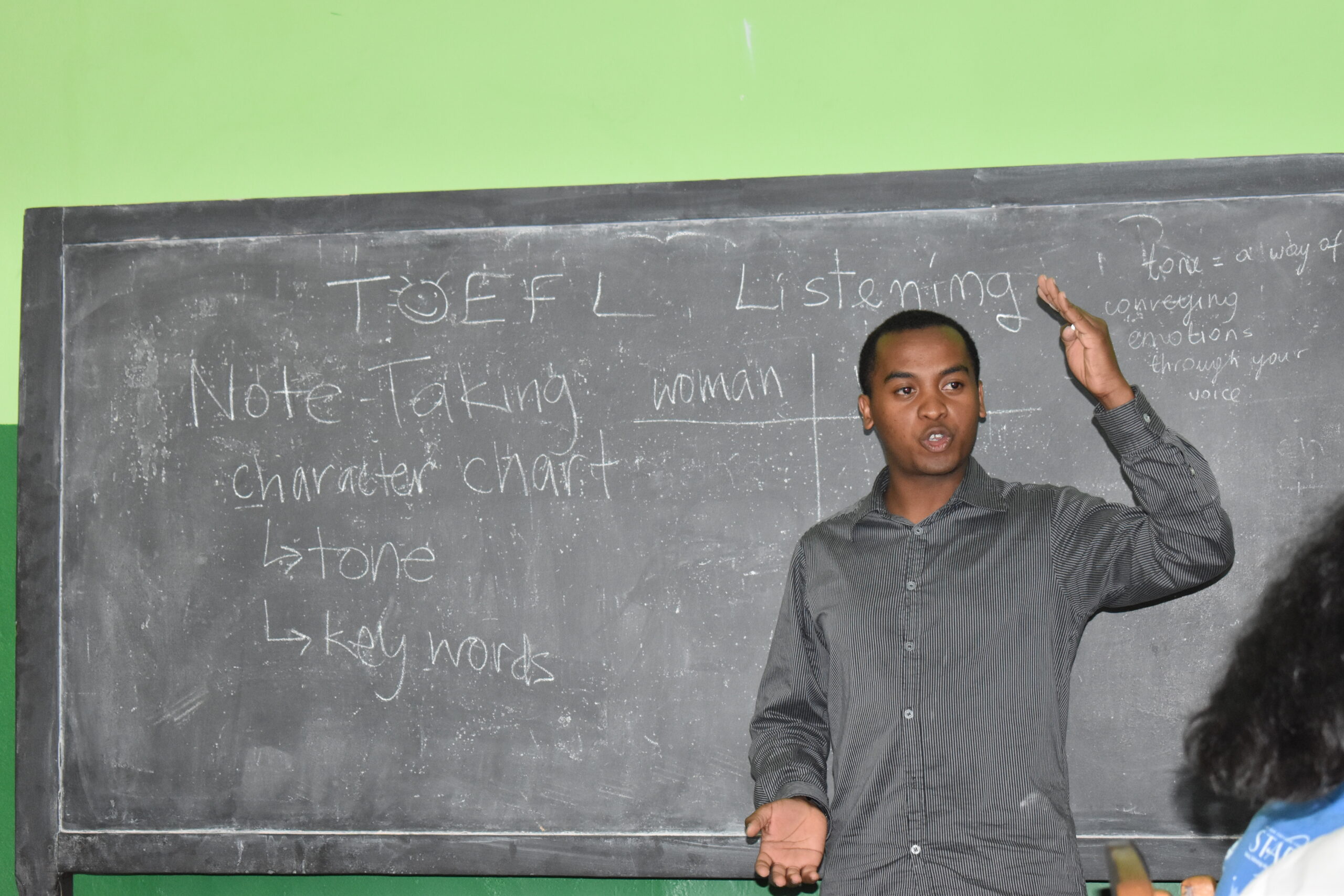
Tafita Rakotozandry ’22 teaches a group of LIME mentees at their high school in Madagascar.
“One of the hardest things for me was just wrestling with the fact that we only had three weeks. That may seem like, ‘You’re there for a set amount of time, so do as much as you can do.’ But at the same time, it’s one thing to really integrate yourself into a culture and understand what they’re going through, versus being there and kind of feeling like you’re looking at a fish tank,” says Devin On ’22, who is part of the 2020 team of Lafayette mentors. “You’re an outsider, and you don’t even speak the language. We prepared for a full semester before we even left, and even that wasn’t enough. I was taken aback, but I was also amazed at how different, yet the same, we are being across the globe from each other.”
“The students work so hard,” says Aurie Greenberg ’22. A lot of them walk 5 miles just to go to school every day. They’re so grateful to be at school, and this program is very different from anything they’ve experienced before. They really show that they care, and that’s also a big part of their culture.”
“They’re all about collaboration and a big sense of community,” echoes On. “The way they welcomed us is something I’ll never forget.”
One-time LIME mentees, like Tafita Rakotozandry ’22, go on to become mentors once they become Lafayette students. The experience can take on a whole other meaning for those who have experienced what it’s like to both sit in the classroom seats and stand in front of the classroom teaching.
“In my country, we were taught that students should always listen in class and it is forbidden to talk about your opinion on a subject because professors are more knowledgeable than you. At Lafayette, it is so different. Students are so comfortable to talk about their ideas and have open discussions with their professors about any number of subjects,” says Rakotozandry. “When we led the LIME program, we wanted our mentees to have similar attitude in our classroom during the program. We supported them to give more value to their ideas and have better self esteem. It was hard during the first few days, but our students improved a lot during the time we were there.”





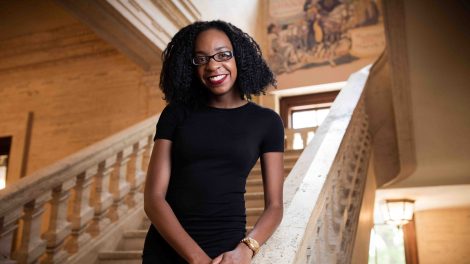

1 Comment
So happy to read about your work in Madagascar. It’s a country so remote but also so much within China’s realm. From this perspective, we can see how much we all care about the world – people’s sufferings’ due to natural and socio-poliyical reasons. For this reason, I solute you and will continue to support the College.
Best wishes,
Hongyi Yin,
Beijing, China.
Comments are closed.